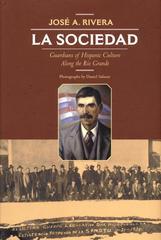
Properties
| Author | José A. Rivera |
| Editorial | University of New Mexico Press |
| ISBN | 139780826348944 |
| Publish date | February 15, 2011 |
La Sociedad: Guardians of Hispanic Culture Along the Rio Grande
In 1900 Celedonio Mondragón and several other San Luis valley residents formed the Sociedad Protección Mutua de Trabajadores Unidos (SPMDTU) to help prevent the usurpation of Hispanic land ownership and to combat discrimination against wage laborers. The SPMDTU rapidly grew into a tristate organization with sixty-five local concilios (lodges) in New Mexico, Colorado, and Utah. Hispanic mutual aid societies proliferated at the turn of the twentieth century, providing such services as religious aid, burial funding, low-cost insurance, and fraternal support. The SPMDTU consolidated relief and support services and became a powerful force in helping families survive the transformations wrought by the influx of Anglos, the federal government, and new technologies. In the early twentieth century, the federal government became the primary welfare service provider for rural communities, but the SPMDTU has survived in the Southwest, continuing its traditions of fellowship and support. Beginning with the social and economic conditions that gave rise to La Sociedad and culminating with its centennial anniversary in 2000, José Rivera examines the SPMDTU as a case study of collective action in the context of a pluralistic American society, rapid social change, and the dynamics of mobilization for cultural survival. Rivera’s study explores the core values that have bonded SPMDTU members across generations and have sustained the organization for more than a century and addresses the question of whether or not La Sociedad will survive in the twenty-first century.
En 1900 Celedonio Mondragón y varios otros residentes del valle de San Luis formaron la Sociedad de Protección Mutua de Trabajadores Unidos (SPMDTU) para ayudar a prevenir la usurpación de la propiedad de la tierra hispana y para combatir la discriminación contra los asalariados. La SPMDTU creció rápidamente hasta convertirse en una organización triestado con sesenta y cinco concilios locales (logias) en Nuevo México, Colorado y Utah. Las sociedades hispanas de ayuda mutua proliferaron a comienzos del siglo XX, brindando servicios tales como ayuda religiosa, fondos para entierros, seguros de bajo costo y apoyo fraternal. La SPMDTU consolidó los servicios de asistencia y socorro y se convirtió en una fuerza poderosa para ayudar a las familias a sobrevivir a las transformaciones causadas por la afluencia de anglos, el gobierno federal y las nuevas tecnologías. A principios del siglo XX, el gobierno federal se convirtió en el principal proveedor de servicios de bienestar para las comunidades rurales, pero la SPMDTU ha sobrevivido en el suroeste, continuando con sus tradiciones de compañerismo y apoyo. Comenzando con las condiciones sociales y económicas que dieron origen a La Sociedad y culminando con su centenario en el año 2000, José Rivera examina la SPMDTU como un estudio de caso de acción colectiva en el contexto de una sociedad estadounidense pluralista, un cambio social rápido y la dinámica de la movilización para la supervivencia cultural. El estudio de Rivera explora los valores centrales que han unido a los miembros de SPMDTU a lo largo de generaciones y han sostenido a la organización durante más de un siglo y aborda la cuestión de si La Sociedad sobrevivirá o no en el siglo veintiuno.
